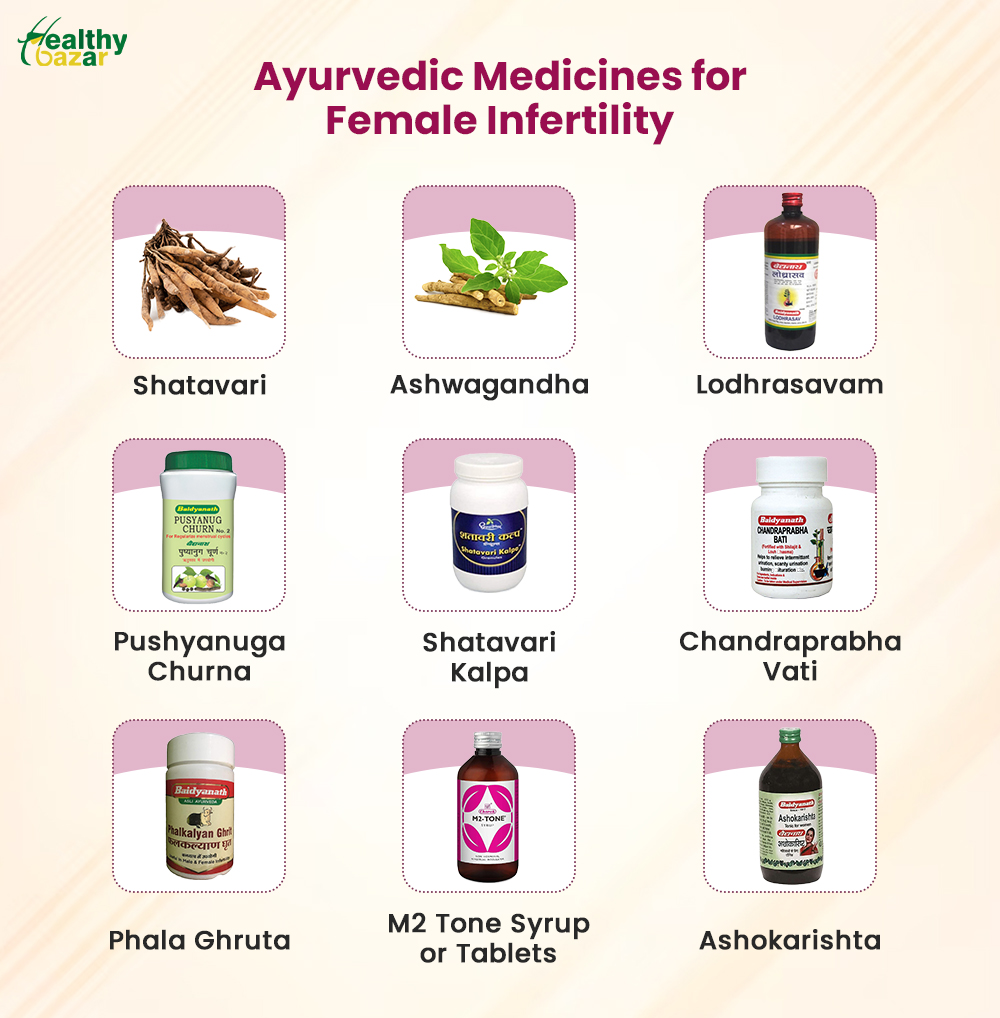 Where should we deliver your order?
Where should we deliver your order?The Truth About Female Masturbation and Fertility

Masturbation, the act of stimulating one's own genitals for sexual pleasure, is a natural and common behaviour observed in both males and females. While it is often a private and personal activity, it has been the subject of various myths and misconceptions. One such myth is whether female masturbation causes infertility. In this blog post, we will delve into the facts surrounding this topic and explore Ayurvedic treatments for female infertility.
Is Female Masturbation Safe?

Female masturbation is generally considered a safe and normal aspect of human sexuality. It's a private and personal activity that allows individuals to explore their bodies, relieve sexual tension, and experience sexual pleasure. However, cultural, religious, or societal attitudes toward masturbation can vary, and some individuals or communities may have different views on the topic.
Some key points highlighting the safety of female masturbation are as follows:
1. No Physical Harm
Masturbation, when done with clean hands and in a private setting, does not cause any physical harm. The female genitalia are designed for pleasure, and masturbation is a safe way to explore one's own body.
2. No Risk of Pregnancy or STIs
In India, around 6% of the adult population has one or more sexual transmitted disease. Unlike sexual intercourse, masturbation does not involve the exchange of bodily fluids, so there is no risk of pregnancy or sexually transmitted infections (STIs).
3. Emotional Well-Being
Masturbation can positively contribute to emotional well-being by reducing stress, promoting relaxation, and improving mood.
4. Personal Choice
It's important to emphasize that masturbation is a personal choice. Individuals should engage in it only when they feel comfortable and ready to do so, respecting their boundaries and comfort levels.
Does Female Masturbation Cause Infertility?
No, female masturbation does not cause infertility. Infertility is typically caused by various factors such as hormonal imbalances, structural issues in the reproductive organs, ovulation problems, age-related fertility decline, medical conditions, or lifestyle factors. Masturbation is not one of these causes. Here's why:
- No Impact on Reproductive Organs: Masturbation, whether done by females or males, does not affect the reproductive organs directly. It does not interfere with the process of ovulation, fertilization, or implantation of a fertilized egg in the uterus.
- Normal Sexual Activity: The female body is designed to experience sexual pleasure, and masturbation is a healthy way to explore one's own body and understand sexual responses.
Infertility and Ayurvedic Treatment
Female infertility, defined as the inability to conceive or carry a pregnancy to full term despite regular, unprotected sexual intercourse, is a medical condition with various underlying causes. Infertility in Ayurveda is referred to as "Vandhyatva" or "Vandhya," and it is considered a complex condition that can have multiple causes related to the imbalance of doshas in the body. Ayurveda offers holistic approaches to address the imbalance of doshas - Vatta, Pitta, and Kapha which can contribute to infertility. These doshas govern different functions in the body and need to be in balance for optimal health. A sedentary lifestyle, improper diet, stress, toxins, or other underlying health conditions can lead to an imbalance of the doshas.
The Impact of Stress on Fertility
When it comes to fertility, the effect of stress should not be underestimated. When the body is constantly in "fight or flight" mode, the reproductive system often takes a backseat, as the body prioritizes survival over reproduction. Chronic stress disrupts the hormonal balance essential for reproductive health. It can lead to dysregulation in essential hormones such as cortisol, insulin, and sex hormones like estrogen, progesterone, and testosterone. This hormonal imbalance can profoundly affect the reproductive process, interfering with ovulation, the menstrual cycle, and even the successful implantation of a fertilized egg.
Additionally, stress-related hormonal imbalances often result in irregular or absent menstrual periods, posing significant challenges to conception. Furthermore, elevated stress levels often lead to a decreased libido, dampening the desire for sexual intercourse, which is crucial for conception.
Ayurveda provides a holistic approach to fertility care, incorporating effective stress reduction techniques. Among these techniques, Ayurveda strongly advocates the practice of yoga and regular meditation. These activities not only promote physical well-being but also calm the mind, reduce stress hormones, and help maintain a balanced nervous system.
Ayurvedic Dietary Recommendations for Fertility
Diet plays a vital role in Ayurveda, not just for general health but also for fertility. Ayurvedic dietary recommendations aim to balance the doshas and support reproductive health. The concept of balanced nutrition in Ayurveda revolves around incorporating all six tastes—sweet, sour, salty, pungent, bitter, and astringent—into one's diet. Each taste is believed to have specific effects on the body, contributing to a harmonious balance within. Moreover, Ayurveda advocates seasonal eating, encouraging individuals to consume foods that align with nature's rhythms during specific times of the year. Additionally, certain foods are considered particularly beneficial for fertility within Ayurveda, such as ghee (clarified butter), known for nourishing reproductive tissues, and nutrient-rich foods like dates and almonds believed to boost fertility. Adequate hydration is essential. Ayurveda often recommends warm water with herbal infusions to support digestion and maintain bodily equilibrium.
Also Read: Explore Relation Between Female Masturbation & Fertility
Ayurvedic Medicine for Female Infertility

Ayurvedic treatment for infertility is personalized, considering the unique constitution (Prakriti) of the individual and the specific imbalance present. The treatment approach may include the following:
Some Ayurvedic medicines for female infertility are as follows:
- Shatavari: A well-known Ayurvedic herb that is often used to support female reproductive health. It helps in balancing the hormones and nourishing the reproductive organs.
- Ashwagandha: Ashwagandha is an adaptogenic herb that reduces stress and improves overall reproductive health.
- Chandraprabha Vati: This Ayurvedic formulation is believed to balance Vata and Kapha doshas and support the female reproductive system.
- Shatavari Kalpa: Shatavari is a popular herb used in Ayurveda for female fertility. Shatavari Kalpa is available in the form of a powder or granules and is used to nourish the reproductive organs and balance hormones.
- Pushyanuga Churna: This herbal powder is used to regulate menstrual cycles and improve female fertility.
- Phala Ghruta: This medicated ghee (clarified butter) is used in Ayurveda for promoting fertility and supporting the reproductive system.
- Ashokarishta: This Ayurvedic liquid preparation is commonly used to address menstrual irregularities and support female reproductive health.
- Lodhrasavam: Lodhrasavam is an Ayurvedic liquid preparation that is believed to be beneficial for female infertility and various gynaecological issues.
- M2 Tone Syrup/Tablets: M2 Tone is a popular Ayurvedic formulation used to support female reproductive health, regulate menstrual cycles, and address hormonal imbalances.
Conclusion
The idea that female masturbation causes infertility is a baseless myth. Masturbation, a natural and healthy aspect of human sexuality, does not hinder a woman's ability to conceive or carry a pregnancy to term. Ayurveda emphasizes the balance of doshas, nourishment of the reproductive system, dietary adjustments, lifestyle enhancements, detoxification, stress management, and the use of Ayurvedic medicines and herbal formulations. For those seeking guidance on Ayurvedic treatments and consultations by sexologist, HealthyBazar is a valuable resource. Connect with Dr Shivani Nautiyal- expert in male and female health and fertility issues. According to your issue and doshas Dr. Shivani will offer personalized advice and recommend suitable herbal remedies. Embracing a comprehensive approach that includes sexual education and Ayurvedic wisdom, we can foster not only better reproductive health but also a deeper understanding of the complex interplay between our bodies and our overall well-being.
This article is written/approved by:

Dr. Shivani Nautiyal
Dr. Shivani Nautiyal is a renowned Ayurvedic physician, Panchakarma therapies specialist, and detox expert who has made significant contributions to the field of natural holistic healing and wellness. With her profound knowledge, expertise, and compassionate approach, she has transformed the lives of countless individuals seeking holistic health solutions. She is a Panchakarma expert, which are ancient detoxification and rejuvenation techniques. She believes in the power of Ayurveda to restore balance and harmony to the body, mind, and spirit.

 Sexual wellness
Sexual wellnessHow Do Sex Hormones affect Women’s Life?
 Dr. Shivani NautiyalFeb 28, 2026
Dr. Shivani NautiyalFeb 28, 2026 Sexual wellness
Sexual wellnessHow does Birth Control Methods Affect Sex Drive and Sexual Desire
 Dr. Shivani NautiyalFeb 28, 2026
Dr. Shivani NautiyalFeb 28, 2026 Sexual wellness
Sexual wellness5 Natural And Ayurvedic Treatment For Vaginal Yeast Infection For Women
 Dr. Shivani NautiyalFeb 28, 2026
Dr. Shivani NautiyalFeb 28, 2026 Sexual wellness
Sexual wellnessHow Do Sex Hormones affect Women’s Life?
 Dr. Shivani NautiyalFeb 28, 2026
Dr. Shivani NautiyalFeb 28, 2026 Sexual wellness
Sexual wellnessHow does Birth Control Methods Affect Sex Drive and Sexual Desire
 Dr. Shivani NautiyalFeb 28, 2026
Dr. Shivani NautiyalFeb 28, 2026 Sexual wellness
Sexual wellness5 Natural And Ayurvedic Treatment For Vaginal Yeast Infection For Women
 Dr. Shivani NautiyalFeb 28, 2026
Dr. Shivani NautiyalFeb 28, 2026
















 5
5




